Pro-soda tax groups counter industry dollars with grass roots Richmond campaign
By Robert Rogers
Contra Costa Times
Posted: 10/31/2012 02:35:46 PM PDT
Updated: 10/31/2012 02:35:47 PM PDT
RICHMOND -- Supporters of the hotly contested ballot measure here to tax sugar-sweetened beverages are relying on volunteers and creativity to get their message out to local voters in the closing days of a campaign that has drawn national attention and millions in anti-tax spending by the soda industry.
Youth artists spray-paint anti-soda "Yes on N" murals on street corner buildings, with the owners' permission. And Councilman Jeff Ritterman, the retired cardiologist-turned-councilman who leads the Measure N effort, has done hundreds of interviews with media from around the world and spent thousands of hours campaigning.
He pulls a wagon carrying 40 pounds of sugar -- a prop meant to personify the amount the average child consumes in a year -- and spends late nights pecking rhetoric into his keyboard, jousting with critics and naysayers on social media platforms.
He's been shouted down at parks and in church parking lots, but on Monday night he made his case to 80 people gathered at Bethlehem Missionary Baptist Church for a town-hall meeting.
Relying on local African-American sports and health advocates to do most of the talking to one of the city's oldest black congregations, he nevertheless bemoaned the "polarization" that has cleaved residents over his measure that could make Richmond the first city in the nation to tax sugar-sweetened drinks.
"We have to keep the focus on our children and how to make the city a better place for them," Ritterman said.
Erick Avery, coach of the Richmond Half-Steppers, a youth track club, had just finished speaking on the need for recreation funding from the penny-per-ounce business tax.
Keenly aware of the $2.5 million spent so far against the measure, Ritterman did what he seldom does -- acknowledged the possibility of defeat on Tuesday. As of Oct. 20, the pro-Measure N "Fit for Life" campaign had spent less than $50,000 from mostly small donors.
"Win or lose, we have to figure out a way to support (the Half Steppers)," Ritterman said.
It's in Richmond's working-class neighborhoods where the ballot battle will be won or lost, and skeptics say the pro-tax activists can't overcome the money and the blunt "no on new taxes" message against them.
Otheree Christian, president of the Iron Triangle Neighborhood Association, said he liked much of what he heard Monday but that his mostly African-American and Latino neighborhood is leaning against the measure and can't be persuaded.
"In this economy, with people struggling, putting in a new tax is not going to work, no matter how you try to dress it up," Christian said.
Several speakers Monday appealed directly to the city's African-American and Latino communities, calling sugar-sweetened beverages "poisons" that are fueling obesity, diabetes and other health maladies.
Mayor Gayle McLaughlin and other elected leaders joined Ritterman at the church and pushed hard for the measure. McLaughlin pledged to pass postelection legislation requiring that every dollar from Measure N goes to youth health and recreation programs, another in a long line of tweaks to the message that the pro-N side has made over months of campaigning to counter critics.
With its vast budget, The Community Coalition Against Beverage Taxes counts hundreds of local businesses and influential community groups, including the NAACP and Black Women of Political Action (BWOPA), among its members. The city's streets and airwaves are awash in "No on N" ads, funded by the Washington D.C.-based American Beverage Association's support. The coalition has also provided thousands in direct payments to influential community leaders, including to the Black American Polical Action Committee (BAPAC) and its treasurer, Joe Fisher.
"Without Big Soda's money, there would be no organized opposition against the soda tax," Ritterman said. Critics have complained that Ritterman and his allies initially overlooked the support of local churches and leaders, opening the door for the beverage industry to make inroads. Ritterman disagrees.
"No regrets," Ritterman said. "We have worked hard. We have run an honest campaign."
Observers close to the campaigns on both sides say N has a slim chance at passage but still marvel at the spirited, crafty, bare-bones campaign that pushed Richmond into the national spotlight on public health policy.
The battle in Richmond may be lost this year, they say, but the larger war changing the beverage industry is still in their favor.
"This really advanced the cause no matter how the vote turns out," said Councilman Tom Butt. "A lot of people have been watching this, learning what to do and what not to do, and I am sure there will be other cities that will take this up."
Contact Robert Rogers at 510-262-2726 or rrogers@bayareanewsgroup.com and follow Twitter.com/roberthrogers.
MEASURE N
Here is a synopsis of Measure N, which could make Richmond the nation's first city to impose a penny-per-ounce tax on merchants who sell sugar-sweetened beverages.
WHAT IT WOULD DO: Impose a penny-per-ounce tax on businesses that sell sugar-sweetened beverages in the city of Richmond. Advisory measure urges current and future councils to use tax proceeds on local childhood obesity reduction and recreation programs.
VOTES TO PASS: Needs a simple majority of Richmond voters on Nov. 6.
Election 2012: Measure N and Measure O
By Rachel de LeonPosted moments ago
A group of progressive city leaders that have never shied from social engineering are now trying to pull off a first-in-the-nation challenge: get voters to approve a tax on sugar-sweetened drinks.
Councilmember Jeff Ritterman and the Richmond Progressive Alliance have fiercely advocated for Measure N, which would tax businesses one cent per ounce of sugar-sweetened beverages they have in stock. The money would go into the city’s general fund, but a nonbinding companion Measure O would advise the City Council to spend the money on anti-obesity programs, sports fields, and cooking and nutrition classes.
RPA members wear the support on their backs, hang it in their cars, and pass it around on the streets of Richmond. In their office sits a red wagon filled with 40 pounds of sugar, which Ritterman says represents how much sugar a child will consume in one year from drinking soda.
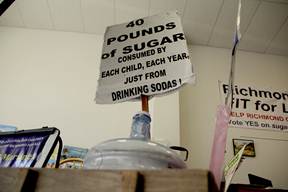
A red wagon containing 40 pounds of sugar is housed in the Richmond Progressive Alliance’s office. (Photo by: Rachel de Leon)
More than half of Richmond’s children are overweight or obese, according to a report prepared by Contra Costa Health Services in 2011. The adult obesity rate in Richmond is 24 percent—while the national average is 35 percent—and it’s estimated that when the current generation of children reaches adulthood, that number will spike to 42 percent.
Just how much sugar-sweetened beverages contribute to those percentages is what health professionals and those in the beverage industry are debating.
A 2010 study conducted by the Center for Weight and Health out of UC Berkeley found that “sweetened beverages account for at least one-fifth of the weight gained between 1977 and 2007 in the US population.”
In a recent lecture at UC Berkeley, Kelly Brownell, the director of the Rudd Center for Food Policy and Obesity at Yale, said sugar-sweetened beverages are “public enemy number one in targeting the nation’s obesity.”
Those on the other side of the debate don’t dispute that obesity rates are rising and a cause for concern, but they point to studies that have shown a decrease in the consumption of added sugar in the United States. A study from The American Journal of Clinical Nutrition found that between 1999 and 2008, there was a steady decline in the intake of added sugar, which the researchers attribute to a reduction in soda consumption. When comparing 1999-2000 and 2007-2008, the daily average intake of added sugars decreased from 100 grams to 76 grams.
Dr. Brazell Carter, a Richmond doctor who is shown on campaign mailers opposing Measure N has echoed what others in the community say is wrong with the measure.
“I think we need to have a fair and balanced approach to say that sugar is not the only thing that makes you fat,” he said. “There are other things that go along with it—the fat and the salt. It’s the combination of the three.”
Though he said he’s not a proponent of the sugar industry, he said it should not be labeled as the lone culprit.
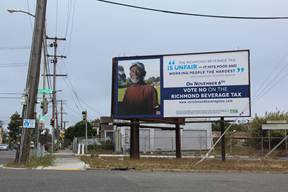
One of the billboards opposing Measure N is displayed at the intersection of Ripley and Harbor Way. (Photo by: Rachel de Leon)
The Community Coalition Against Beverage Taxes, a committee formed to oppose Measure N, has spent more than $2.4 million to defeat the tax. Most of its funding comes from the American Beverage Association, a trade organization with members such as Coca-Cola and Pepsico.
Billboards and signs opposing the measure line just about every block on major streets in Richmond.
“The Richmond Beverage Tax is unfair—it hits poor and working people the hardest,” reads one billboard on Harbor Way.
Opponents call the tax regressive and claim the poor will pay for the brunt of the tax.
In his lecture, Brownell said he doesn’t buy that argument.
“I think taxes are only regressive if people really need what they’re buying,” he said.
The CCABT’s website cites findings from the Berkeley Research Group, a private consulting firm based in Emeryville, that it will “cost Richmond consumers and businesses up to $12.8 million in new taxes and loss of revenue.”
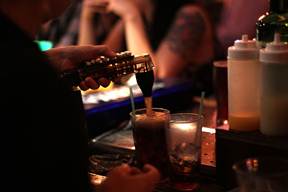
A bartender at Up and Under uses the soda gun to pour a customer a drink. (Photo by: Rachel de Leon)
Local businesses “are going to lose sales because the people who can or are motivated to will go elsewhere to shop,” Finnie said.
The CCABT’s website lists dozens of businesses in Richmond that oppose the measure.
Nathan Trivers’ business isn’t one on the list. His restaurant Up and Under in Point Richmond regularly serves city councilmembers, including Ritterman, but he didn’t hesitate to critique the tax.
“I don’t feel the thing has any legs,” Trivers said.
Trivers said he doesn’t oppose taxes on businesses, but said he doesn’t believe the revenue will go toward what Measure O pledges.
“Show us where the money’s going,” Trivers said.
Mayor Gayle McLaughlin said she and Ritterman wrote the measure to have the tax revenue go into the general fund because it requires only a simple majority to pass, instead of a two-thirds majority if it had the funds going toward something more specific.
“With the money that Big Soda is putting into this, it’s already quite a battle,” McLaughlin said. “But if we had to get two-thirds vote, it would have been a bigger battle. So we thought this was the better way.”
Measure N makes the tax a part of the business license fee, which is paid once a year by business owners. The current fee is $234.10 a year, not including additional money based on the businesses’ number of employees. Because the tax is based on inventory, not sales, the decision to pass the tax onto the consumer rests on the businesses.
Trivers said he would have to increase his prices.
“I’m not taking it out of my backend for the city,” he said.
The measure has also left some business owners confused about logistics. City officials admit that because there is no model for Richmond to follow, there are still questions to address if the measure passes.
“It’s new for us,” said Financial Director James Goins, whose department collects city taxes.
Ritterman said this could be used to the city’s advantage. Any money invested in the taxation system, he said, could be recouped by selling it as a toolkit to other cities that want to follow in Richmond’s footsteps.
But with even the authors uncertain about the final implementation of the measure, the questions haven’t stopped there for business owners like Trivers.
Trivers’ restaurant has a fountain machine behind the counter, which mixes syrup from a bag with soda water to make the finished drink, what ends up in the customer’s cup. Ritterman said the measure would tax businesses on the finished drink, based on a syrup-output ratio that the city will determine.
After hearing this, Trivers paused.
“We’ll just try to talk this out so we both understand clearly on what this means,” Trivers said.
“So I grab a 16-ounce mug, OK? I put ice in it, and I fill it up with liquid. Now, the liquid—if I had no ice—it’s 16 ounces of soda,” Trivers said.
“They need to get their shit straight and figure out their mathematics,” he said.

Up and Under’s owner Nathan Trivers sits in front of the bags-in-a-box syrup containers which are delivered to the bartender a floor above in the form of soda. (Photo by: Rachel de Leon)
Milt Moritz, president of the National Association of Theatre Owners of California/Nevada, said for movie theatres, a tax on the finished drink would not be an accurate measure of how much soda they actually produce. Moritz said that when theaters are experiencing high traffic and long lines, employees aren’t going to wait until the syrup container has run out to refill the machine. This would mean theaters would be paying for syrup they didn’t use, he said. Cinemark, the movie theater company that owns Richmond’s only theater, has contributed nearly $107,000 against the measure.
Although Ritterman says the measure is intended to target sodas, other kinds of beverages fall under the city’s definition of a sugar-sweetened beverage and would be taxed as well—including sports drinks, fruit juices with added sugar, and chocolate milk.
There are beverages exempted from the law, such as diet drinks, a point clarified earlier this month in a “Sugar-Sweetened Beverage Policy” document issued by the city attorney.
Dietary aids are also exempted, which would make infant formula and oral nutritional beverages like Ensure not taxable.
Other drinks are not so simple to tax. Places like Starbucks— where consumers can decide how much syrup they want in their drink— don’t have a definite answer about what and how they’ll be taxed. Ritterman said he wasn’t sure yet and would need to see what others thought once the measure has passed.
For Ritterman, it’s the big picture that counts most – and the fight against sugar and soda is parallel to earlier fights to regulate and tax tobacco.
“[Big Soda] is really the Big Tobacco of today,” Ritterman has said. “And they’re going to have the same outcome as Big Tobacco.”
Karen Hanretty, the vice president of public affairs for the American Beverage Association, called the comparison “absurd,” since there’s no danger from “second-hand soda.”
“It’s almost offensive,” she said, “that you would compare that and almost diminish the significance of [smoking] by comparing it to a sparkly beverage. It’s such an overreach.”
For others who worked on tobacco policy reform, they see overlap in the ABA’s argument against taxation and what cigarette companies said back in the ‘70s.
“Tax on the poor—same argument for tobacco,” said Steve Sugarman, who worked on tobacco research after Prop 99 passed and increased California’s cigarette tax 25 cents in 1988.
But, he said, just as with tobacco regulation, the tax’s success would depend on how consumers react to the policy.
“In other words, people who were at the poor end had a way of dealing with that. And I think that’s what will happen here. A lot of poor people, they’ll switch to house brands,” he said. “But you won’t get any less sugar consumption out of that.”
Sugarman said it was a combination of taxes, restrictions on where to smoke, and hostile advertisements against the industry that gave tobacco the bad image it has now. But Sugarman said although there are similarities between the two policy regulations, audiences are not viewing soda companies in the same way they view cigarette companies.
“I mean, people like soft drinks,” he said. “People don’t view Coke and Pepsi the way they view Camels and Philip Morris.”
Finnie said he sees linking the two industries as Ritterman’s goal, and that vilifying soda companies is already taking place in Richmond. Ritterman is playing a bigger game to “demonize soda companies, to use demagoguery, and to accuse them without foundation that somehow the soda industry is responsible for the obesity problem in the country,” Finnie said.
For Stanton Glantz, Director of the Center for Tobacco Control Research and Education at UCSF, and a key figure in the decades long battle against smoking, the trajectories that soda and cigarette companies are on is almost identical.
“To me, it’s like a 97 percent parallel. The only difference is there’s a different big corporate interest who’s trying to oppose a sensible public health regulation,” he said. “It’s the big corporate interests fighting against grassroots citizens’ efforts.”
Opponents of Measure N also question whether a penny-per-ounce tax will be enough to significantly reduce the consumption of sugar-sweetened beverages and have any noticeable impact on the obesity rate.
Several studies have shown that a tax on sugar-sweetened beverages could have an impact on consumption, but the results vary based on how high the tax is.
According to a 2010 United States Department of Agriculture study, taxing sugar-sweetened beverages by 20 percent could result in an average reduction in 43 calories per day, or 4.5 pounds over a year for children.
A study out of the Institute for Health Research and Policy at the University of Illinois, Chicago found that an estimated 24 percent reduction in sugar-sweetened beverage consumption from a penny-per-ounce tax could reduce someone’s daily caloric intake by 45 to 50 calories.
Richmond’s sugar-sweetened beverage town hall draws tears, personal testimonies
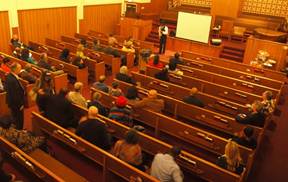
Residents attended a town hall meeting convened to discuss Measure N in Richmond on Monday. Photo - Tawanda Kanhema
By Tawanda KanhemaPosted 59 minutes ago
Jovanka Beckles
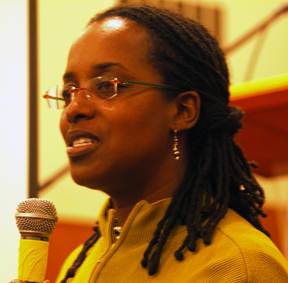
"What affects us most is diabetes," Beckles said. "It is worse than paying an extra 20 cents a day for a can of soda, and heart attacks, that's even worse."
Maya Rockeymoore

“It will be a mistake to think about the obesity crisis in strictly personal terms because it is systematic, we are surrounded all the time by an environment in which unhealthy drinks are advertised. We are living in our own version of the matrix in which a manufactured version of reality is killing us.”
Families from Richmond’s African American community testified Monday night to the fight against the health effects of poor diets at a town hall meeting to discuss the city’s proposed tax on sugar sweetened beverages.
The town hall, held in the eastern corner of the Iron Triangle neighborhood at the Bethlehem Missionary Baptist Church, attracted at least 80 residents and city officials who came to listen to keynote speaker Maya Rockeymoore, a leading public policy scholar based in Washington D.C.
Rockeymoore called on the African American community to take a closer look at its relationship with soda manufacturers and the effects of their products on public health.
“There is no secret that there has been a long and storied relationship between the African American society and the soda industry,” Rockeymoore said. “They engaged in multicultural marketing and helped create a sense of economic and social inclusion at a time when Jim Crow prevailed and there were no opportunities for African Americans.”
Rockeymoore said soda manufacturers had played an important role in creating economic opportunities for African Americans during the civil rights era and were loyal to the community.
“They have been loyal to us and we have repaid their loyalty by becoming loyal consumers, but due to the link between our health concerns and their unhealthy products, the time has come for us to ask whether we love the products they produce more than we love ourselves,” Rockeymoore said, to applause.
“It’s time for a different relationship based on respect for the sanctity and value of life,” she added. “We face a systemic problem and we need to leverage public policy, that is why the efforts in Richmond have gained attention.”
Rockeymoore told the story of how she had fought obesity growing up, before she dumped all sugar-sweetened beverages and lost weight.
“I had been among the 80 percent of African American women who are considered to be obese. I used to be over 200 pounds, I was addicted to soda,” she said. “It will be a mistake to think about the obesity crisis in strictly personal terms because it is systematic, we are surrounded all the time by an environment in which unhealthy drinks are advertised. We are living in our own version of the matrix in which a manufactured version of reality is killing us.”
Rockeymoore told the crowd at the town hall that her father, a diabetic, had refused to take insulin treatments. There was a moment of silence, and she broke into tears.
“I am not here to tell Richmond residents how to vote but I would like to tell residents to commit themselves to finding solutions to this issue no matter what happens next week,” Rockeymoore said. “It would be a tragedy if a single vote becomes the end of this conversation, no matter where you live or your background.”
Chuck Finnie, the vice president of media and communications at political consulting firm Barnes, Mosher, Whitehurst, Lauter and Partners, was the only person in the room with a No On N button, and he sat quietly. Finnie has spearheaded the campaign against Measure N in Richmond through the Community Coalition Against Beverage Taxes, and said the measure had started a debate that should continue beyond the election.
“There’s nothing she said that I would disagree with,” Finnie said. “It is the beginning of a discourse, and the parties involved have a responsibility to not just walk away after the election.”
Among the city officials who attended the event was Mayor Gayle McLaughlin. McLaughlin wore a Yes On N button and spoke of how her diet as a child was dominated by sodas, which she said were then advertised as “the real thing.”
“I grew up drinking soda drinks for lunch and dinner. It is empty calories, it’s poison to our system,” McLaughlin said. “We have to start somewhere, we have to start making a dent.”
McLaughlin said the City Council would bring legislation specifying that every cent collected in revenue from the measure would go towards efforts to reduce childhood obesity.
“This has been distorted by big soda corporations that are plastering our city with billboards because they have profits to lose, we have something to gain,” she said.
Councilmember Jovanka Beckles called on residents to vote in support of the measure, saying claims by the measure’s opponents that it would hurt the poor ignored the long term effects of unhealthy diets.
“What affects us most is diabetes,” Beckles said. “It is worse than paying an extra 20 cents a day for a can of soda, and heart attacks, that’s even worse.”
Speaking afterward, Richmond resident Brother Rich Riles said he and his family had stopped drinking soda in the 1980s. “We got off all of the sodas in the ‘80s,” he said. “This measure will help a bunch of people stop, and these words” – Rockeymoore’s speech – “need to be heard,” he said.
Richmond resident Felix Hunziker brought a bottle of a sugar-sweetened fruit juice to the town hall.
“This will be taxed, but why? This is not the culprit behind obesity,” Hunziker said outside the church. “I totally respect what Jeff [Ritterman] is trying to do, but a lot of people don’t understand what will be taxed and what will not.”
Ritterman, who was the master of ceremonies, said that although residents were divided over the measure, it was important to note the progress the city has made in implementing reforms since the last election.
“I know it’s an election year and everything is polarized, but we have moved everything forward,” Ritterman said. “Let’s remember how far we have come and celebrate that.”
Here is a letter writing exchange John Geluardi had with Chuck Finnie regarding Geluardi’s Soda War story in the East Bay Express:
Soda War story: http://www.eastbayexpress.com/ebx/the-richmond-soda-war/Content?oid=3371994
N Is Not What It Seems
In John Geluardi's one-sided account of the Richmond Measure N campaign and zeal to make the case for the so-called "soda tax," he misrepresented our campaign's arguments against the measure, and our position on assertions that soda is somehow especially, particularly, or uniquely responsible for the obesity crisis in this country.
To address the second matter first, Councilman Jeff Ritterman, the Measure N sponsor, and the handful of advocacy groups whose water he is carrying in Richmond are unfairly demonizing the soft-drink industry in search of new revenue sources and are making emotional appeals disconnected from the facts, which are these:
Consumption of sugar-sweetened beverages has been and continues to be in decline in the United States while incidents of obesity have been on the rise.
Calories from soda and other sugar-sweetened beverages account for just 7 percent of the total caloric intake of the average American.
And total calories consumed are just one contributor to weight gain along with level of physical activity, genetic predisposition, and others.
So, to the contrary, there is no agreement on Ritterman's justification for Measure N.
Regarding the tax itself, the case against it is this: Measure N is a new business license tax. Under Measure N, businesses in Richmond would be required to pay a fee of a penny per ounce on their inventories or sales of any and all beverages containing any amount of any type of added sugar, including fruit juice concentrate, without exception.
The Measure N definition of sugar-sweetened beverage covers literally hundreds of products — most of them not soda, including flavored milks, many juices, sports drinks, sweetened teas and coffees, and numerous custom concoctions served at local restaurants, as well as certain nutritional supplements and even infant formulas containing added sugar.
Both sides agree that businesses would attempt to pass along to consumers the cost of the tax and of complying with it in the form of higher prices. Indeed, that is the whole point. Those price increases would be applied either to the hundreds of products covered by the measure or, more generally, across entire inventories.
The obviously regressive consequence of this — in higher grocery bills for families (whether they drink soda or not), and lost revenue for local stores and restaurants when consumers go elsewhere to shop and dine — are chief reasons why so many voters, businesses, community leaders and civic organizations oppose Measure N.
Another reason is the fact that the $3 million in estimated annual city tax revenue would be placed in the city's general fund without restriction on its use, other than it is spent for a lawful municipal purpose. Mr. Geluardi falsely writes that state law prevented the authors of N from earmarking the funds for anti-obesity efforts. Councilman Ritterman chose not to write it that way, because he didn't think he could get the two-thirds approval of voters that the California constitution requires of taxes imposed for particular uses or to fund particular programs.
In closing, regarding the campaign spending on the No side on which Mr. Geluardi fixates, the money is being used primarily to educate voters about what Measure N really says and its predictable consequences — as well as to clear up Councilman Ritterman's misleading rhetoric and misportrayals that occasionally appear in articles such as Mr. Geluardi's.
Chuck Finnie
Spokesman, Community Coalition Against the Beverage Tax, No on Measure N
John Geluardi Responds
It is important to highlight that Mr. Finnie is a public relations consultant being handsomely rewarded by the American Beverage Association, which represents the interests of giant corporations such as Dr. Pepper, Coca-Cola, and PepsiCo, to spin the facts against Measure N. However, in Mr. Finnie's self-interested enthusiasm, he takes his argument off to a hazy wonderland of unattributed claims and baseless assertions.
To begin with, Mr. Finnie's assertion that my article is one-sided suggests he did not carefully read it. In fact, Mr. Finnie is quoted in the article, as is Richmond Councilman Nat Bates, who is perhaps the city's strongest opponent of Measure N. Furthermore, the ABA's arguments that the measure would hurt the poor and the organization's doubt about how the city would spend the revenue are put forward and attributed.
Mr. Finnie's assertion that the soft-drink industry is being unfairly demonized is interesting only in that he carefully avoids challenging the overwhelming amount of science that shows sugar-sweetened beverages are a major contributor to weight gain, obesity, diabetes, coronary heart disease, and some cancers. Instead he offers the unattributed, vague, and oversimplified response that consumption of sugar-sweetened beverages is on the decline while obesity is rising and that such drinks are only 7 percent of the average American's caloric intake. In fact, over the past thirty years Americans have increased their consumption by 278 calories per day and the largest dietary change in that period is an enormous increase in soda consumption, according to a 2009 study by the UCLA Center for Health Policy Research.
That study and others are so compelling that medical organizations like the American Diabetes Association, the American Institute for Cancer Research, and the American Heart Association have urged the Surgeon General of the United States to spur a national effort to reduce consumption of sugar-sweetened beverages.
Interestingly, Mr. Finnie chose not to comment on the moral implications of the carbonated drink industry aggressively targeting ads ($474 million in 2006) to society's most vulnerable consumers, young people between the ages of twelve and seventeen who now represent the largest percentage of sugary-drink consumers.
Mr. Finnie further implies Richmond's store and restaurant owners would inappropriately comply with the soda tax by spreading the penny-per-once license fee to other items in their stores, thereby raising costs to all Richmond consumers. The implication is cynical and unfounded.
Mr. Finnie's claim that I "falsely" wrote that state law prevented the authors of Measure N from specifically earmarking funds for anti-obesity programs because of the California constitution is a crafty example of spin in that it appears to challenge what I wrote while at the same time validating it.
Finally, Mr. Finnie's assertion that the ABA is spending millions of dollars to alert Richmond voters about the "predictable consequences" of the measure is a portrayal stretched so thin it's transparent. Mr. Finnie and the ABA are not champions of the public good nor do they have an interest in the health and well being of Richmond residents. They are narrowly focused on their profit margins and very little else.






